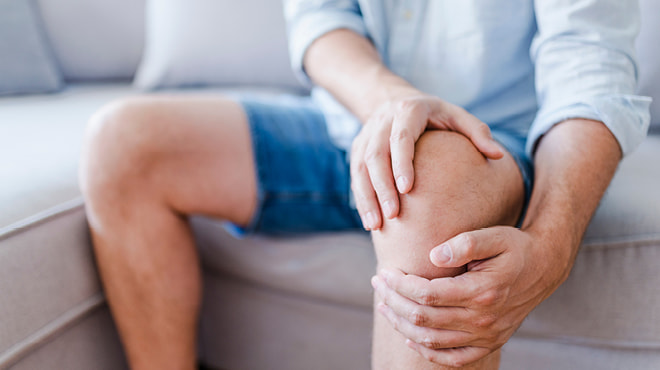Recent Posts
-

-

-
 Patient StoriesA lifesaver saved: An EMS veteran’s journey from rescue to recoveryNovember 14, 2025
Patient StoriesA lifesaver saved: An EMS veteran’s journey from rescue to recoveryNovember 14, 2025
Get the facts about knee pain

Knee pain is one of the most common complaints of Americans of all ages. The pain can result from an injury, arthritis or other condition. The location and severity of knee pain often varies with each person depending on the cause of the problem.
Signs and symptoms of knee pain include:
- Swelling
- Redness
- Stiffness
- Weakness or instability
- Popping or crunching noises
- Inability to fully straighten the knee
The pain in your knee can be caused by a number of factors.
Common causes of knee pain are:
Injury
A knee injury can affect any of the many ligaments, tendons, cartilage or bursae sacs that surround or consist of the knee joint.
Some of the most common knee injuries are:
- Anterior cruciate ligament (ACL)
- Meniscus
- Bursitis
- Tendinitis
Arthritis
More than 100 different types of arthritis exist.
Examples of arthritis that might cause knee pain are:
- Osteoarthritis
- Rheumatoid arthritis
- Gout
- Pseudogout
Mechanical problems
Often caused by an underlying injury, overuse or normal wear and tear, mechanical problems might include:
- Loose piece of cartilage or bone
- Dislocated kneecap
- Gait change because of hip or foot pain
Knee pain treatment
Not all knee pain is serious, but some injuries and conditions can lead to increased pain, joint damage and disability if left untreated. There are many ways to treat knee pain, depending on the severity of the pain and the damage to the knee.
Examples of knee pain treatment include:
- Medication
- Injections
- Physical therapy
- Osteopathic manipulation
- Surgery
There are also ways that you can treat your knee pain at home, such as over-the-counter pain medication, ice, rest, elevation and compression.
While it is not always possible to prevent knee pain, there are some things you can do in your life to help prevent future knee problems, including:
- Maintain a healthy weight.
- Warm up and stretch before physical activity.
- Exercise appropriately for your body.
- Build up muscle.
- Wear proper shoes.
Persistent knee pain can negatively affect your quality of life and can lead to future disability. If you are concerned about knee pain, contact your health care provider team.
By Mayo Clinic Health System staff


